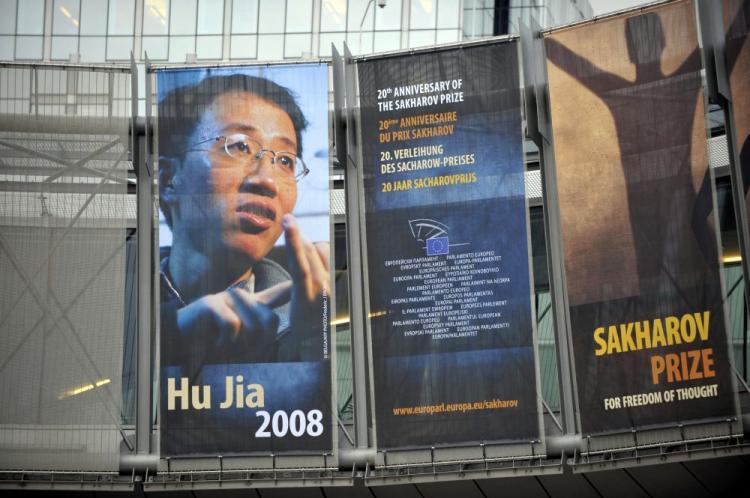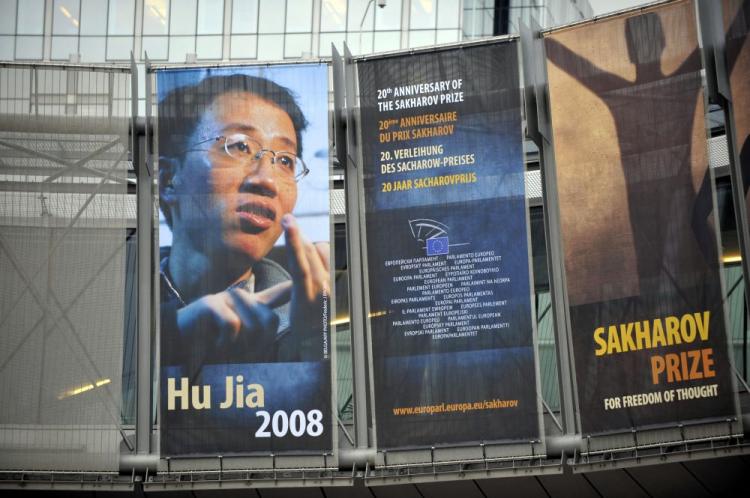Imprisoned, and sick with liver cancer, well-known Chinese human rights activist, Hu Jia, has been denied medical parole again, according to his wife Zeng Jinyan. Hu was sentenced to a 3.5-year prison term on April 3, 2008, after a spurious trial that fell far short of international standards. The “crime” was “inciting subversion against the state,” an offense used to punish those who criticize the Chinese Communist Party.
Before an earlier arrest in May 2006, Hu was diagnosed with liver cancer and other serious illnesses.
The average survival rate of liver cancer five years after diagnosis is 7 percent, according to the Web site www.cancersurvivalrates.net.
In Hu’s case it has been already four years and most of that time was spent inside prison. Prison guards said his parole denial was due him not being “critically ill,” saying Hu has been “disobedient” and that he refuses to “be quiet.”
Heidi Hautala, chairwoman of the European Parliament Subcommittee on Human Rights, expressed her deep concern over Hu’s health, saying, “He should be moved urgently to hospital and the Chinese authorities should grant permission to this end without delay. Application for medical parole should be granted accordingly. Access to health care in serious cases is a human right of grave importance.”
Hu has been legally eligible to apply for medical parole since July 2009, as Chinese regulations permit such applications from medically eligible prisoners who have served one-third of their sentence.
Hu was arrested in Beijing on Jan. 30, 2008, following a statewide crackdown of all dissidents and activists as the Communist Party prepared for the Beijing Olympics.
Hu’s criticisms included a September 2007 letter written with Teng Biao, another human rights activist and leading civil rights lawyer, titled “The Real China and the Olympics.” The letter encompassed very detailed accounts of human right violations carried out by the Chinese regime. They called upon the international community to hold the regime accountable for its human rights promises when the games were awarded to them.
On March 30 this year, the Beijing Prison Administration (BPA) performed a CT scan of Hu Jia’s liver to determine whether he had liver cancer. The BPA told Hu’s family that it would release their test results, but have not done so—arousing suspicion that Hu is not receiving proper care and that his health may be deteriorating.
“The Chinese government should never have sent Hu Jia to prison in the first place,” said Sophie Richardson, Asia advocacy director at Human Rights Watch, in a statement. “Now it is cruelly punishing him by denying medical parole.”
Richardson added, “The Chinese authorities are denying a very sick prisoner proper medical attention, and are cruelly denying his wife and family information about his health.”
Many governments have been talking with the Chinese authorities about Hu’s case. In November 2009, his name was included on a list with about a dozen others given by U.S. officials to their Chinese counterparts in advance of President Barack Obama’s visit to China.
Hu was awarded the European Parliament’s Sakharov Prize for Freedom of Thought in 2008, and since then his imprisonment has been opposed by numerous senior European officials.
Before an earlier arrest in May 2006, Hu was diagnosed with liver cancer and other serious illnesses.
The average survival rate of liver cancer five years after diagnosis is 7 percent, according to the Web site www.cancersurvivalrates.net.
In Hu’s case it has been already four years and most of that time was spent inside prison. Prison guards said his parole denial was due him not being “critically ill,” saying Hu has been “disobedient” and that he refuses to “be quiet.”
Heidi Hautala, chairwoman of the European Parliament Subcommittee on Human Rights, expressed her deep concern over Hu’s health, saying, “He should be moved urgently to hospital and the Chinese authorities should grant permission to this end without delay. Application for medical parole should be granted accordingly. Access to health care in serious cases is a human right of grave importance.”
Hu has been legally eligible to apply for medical parole since July 2009, as Chinese regulations permit such applications from medically eligible prisoners who have served one-third of their sentence.
Hu was arrested in Beijing on Jan. 30, 2008, following a statewide crackdown of all dissidents and activists as the Communist Party prepared for the Beijing Olympics.
Hu’s criticisms included a September 2007 letter written with Teng Biao, another human rights activist and leading civil rights lawyer, titled “The Real China and the Olympics.” The letter encompassed very detailed accounts of human right violations carried out by the Chinese regime. They called upon the international community to hold the regime accountable for its human rights promises when the games were awarded to them.
On March 30 this year, the Beijing Prison Administration (BPA) performed a CT scan of Hu Jia’s liver to determine whether he had liver cancer. The BPA told Hu’s family that it would release their test results, but have not done so—arousing suspicion that Hu is not receiving proper care and that his health may be deteriorating.
“The Chinese government should never have sent Hu Jia to prison in the first place,” said Sophie Richardson, Asia advocacy director at Human Rights Watch, in a statement. “Now it is cruelly punishing him by denying medical parole.”
Richardson added, “The Chinese authorities are denying a very sick prisoner proper medical attention, and are cruelly denying his wife and family information about his health.”
Many governments have been talking with the Chinese authorities about Hu’s case. In November 2009, his name was included on a list with about a dozen others given by U.S. officials to their Chinese counterparts in advance of President Barack Obama’s visit to China.
Hu was awarded the European Parliament’s Sakharov Prize for Freedom of Thought in 2008, and since then his imprisonment has been opposed by numerous senior European officials.





